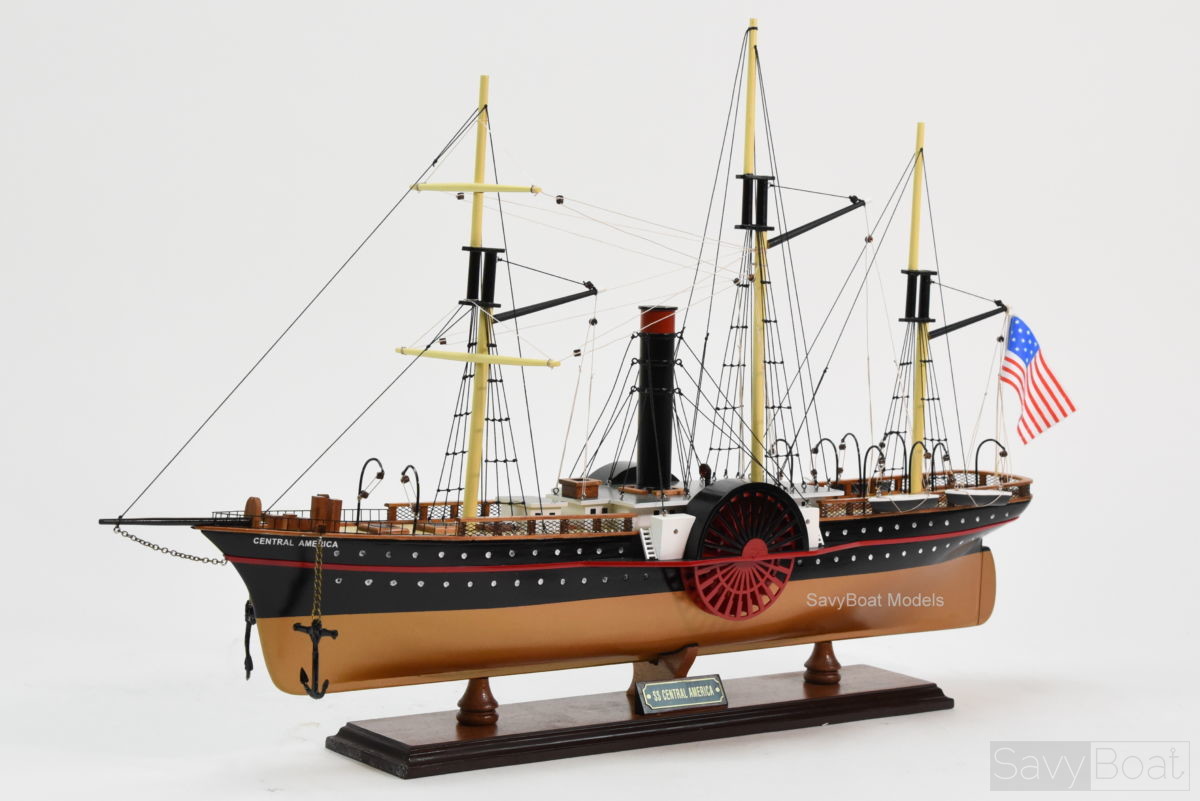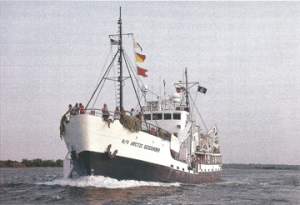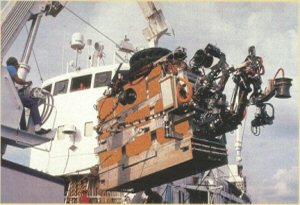HOME PAGE
SS Central America "The Ship Of Gold"
The SS Central America, a 280-foot (85 m) sidewheel steamer, sank with her gold in a hurricane on Saturday September
12th 1857 some 160 miles off the South Carolina coast, 7,200 feet down on the ocean floor.
A 2022 dollar equivalent to $550 million of gold was sitting at the bottom of the ocean for more than 150 years.
Over 10,600 gold coins, 577 gold ingots, over 14,000 silver coins, and 100 pounds of gold dust and nuggets, a total value of $320 million
were recovered from the wreckage of the S.S. Central America steamship in 1988 and a second time in 2014, The original expedition had
only excavated "5 percent" of the ship
On September 9, 1857, the ship was caught up in a Category 2 hurricane while off the coast of the Carolinas. By September 11, the
105 mph (170 km/h) winds and heavy seas had shredded her sails, she was taking on water, and her boiler was threatening to fail. A leak in one of
the seals between the paddle wheel shafts and the ship's sides sealed its fate. At noon that day, her boiler could no longer maintain fire. Steam
pressure dropped, shutting down both the bilge pumps. Also, the paddle wheels that kept her pointed into the wind failed as the ship settled by
the stern. The passengers and crew flew the ship's flag inverted (a distress sign in the US) to signal a passing ship. No one came.
A bucket brigade was formed, and her passengers and crew spent the night fighting a losing battle against the rising water.
During the calm of the hurricane, attempts were made to get the boiler running again, but these failed. The second half of the storm then struck.
The ship was now on the verge of foundering. Without power, the ship was carried along with the storm and the strong winds would not abate.
The next morning, September 12, two ships were spotted, including the brig Marine. Only 153 passengers, primarily women and children, made their
way over in lifeboats. The ship remained in an area of intense winds and heavy seas that pulled the ship and most of her company away from rescue.
Central America sank at 8:00 that evening. As a consequence of the sinking, 425 people were killed. A Norwegian bark, Ellen, rescued an additional
50 from the waters. Another three were picked up over a week later, in a lifeboat.


Search and Discovery
The ship was located by the Columbus-America Discovery Group of Ohio, led by Tommy Gregory Thompson, using Bayesian search
theory. A remotely operated vehicle (ROV) was sent down on September 11, 1988. Significant amounts of gold and artifacts were recovered
and brought to the surface by another ROV built specifically for the recovery. The total value of the recovered gold was estimated at $100–150
million. A recovered gold ingot weighing 80 lb (36 kg) sold for a record $8 million and was recognized as the most valuable piece of currency
in the world at that time. In May of 2013, the US Federal Marshals auctioned off the R/V Arctic Discoverer to a local salvage company. The ship
had been sitting quietly at a dock in Green Cove Springs, Florida for several years. Her fate was sealed, the most famous treasure hunting ship
in US history was now headed to the scrap yard!


The Arctic Discoverer, loaded with the ROV "NEMO"
Aftermath
Thirty-nine insurance companies filed suit, claiming that because they paid damages in the 19th century for the
lost gold, they had the right to it. The team that found it argued that the gold had been abandoned. After a legal battle, 92% of
the gold was awarded to the discovery team in 1996.
In 2000 Thompson sold gold recovered from the Central America for $52 million, he was sued in 2005 by several of the
investors who had provided $12.5 million in financing, and in 2006 by several members of his crew, over a lack of returns for their
respective investments. In 2009 he had an off-shore account in the Cook Islands of $4.16 million. Thompson went into hiding in 2012.
A receiver was appointed to take over Thompson's companies and, if possible, salvage more gold from the wreck, in order to recover money
for Thompson's various creditors.
Thompson was located in January 2015,
along with assistant Alison Antekeier, by US Marshals agents and was extradited to Ohio to provide an accounting of the expedition profits.
he was held in contempt of court on December 15, 2015, for not disclosing the whereabouts of the coins, and the federal judge ordered him to
remain in prison and pay a fine of $1,000 a day until he agreed to cooperate. Ever since, Mr. Thompson has been held in federal prison and as of
2021, has racked up more than $2.1 million in fines. In November 2018, Thompson agreed to surrender 500 gold coins - but then, claimed he has no
access to the missing coins. On November 28, 2018, a jury awarded Investors $19.4 million in compensatory damages: $3.2 million to the Dispatch
Printing Company [which had put up 1 million of 22 million invested] and $16.2 million to the court-appointed receiver of the other investors.
Steven Tigges, the lawyer for one of the investors who sued Thompson, said he could expect release as soon as he handed over the missing funds.
Recovery of The Gold VIDEO - The Arctic Discoverer and ROV "NEMO"
IN-AP Systems - Established 1997
A computer is like the mind, it has IN-finite AP-plications. . .
|